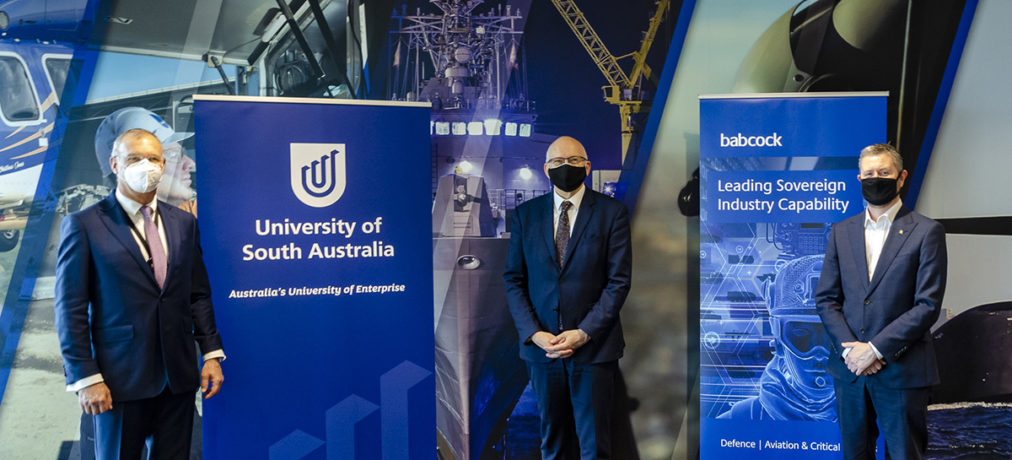Babcock Australasia and the University of South Australia (UniSA) have signed a Memorandum of Understanding (MoU) to develop ‘best of breed’ technology for the Australian Army’s LAND125 Phase 4 Integrated Soldier System (ISS).
The signing of the MoU follows the announcement that Babcock has been down-selected for the next stage of LAND125 Phase 4.
The MoU will open up avenues for Babcock and UniSA to collaborate on technology development, post graduate research, and graduate pipelines.
Babcock Australasia’s Chief Executive Officer, David Ruff, and UniSA’s Vice Chancellor and President, Professor David Lloyd, signed the MoU at Babcock’s Regional Support Centre in Adelaide, South Australia.
The signing ceremony was attended by Minister for Innovation and Skills, the Hon David Pisoni MP and Defence SA’s Executive Director, Defence and Space, Reg Carruthers.
Babcock Australasia’s Head of Business Development, Mick Burgess, said the MoU is part of the company’s ongoing commitment to delivering Australian Industry Capability (AIC).
“Babcock’s partnership with UniSA strengthens our commitment to research and development being conducted in Australia in areas that will generate the best outcome for Defence,” Mr Burgess said.
“As a result of the MoU, Babcock will able to leverage key research being undertaken by UniSA for LAND125 Phase 4 in the areas of human factors, cognitive and systems neuroscience, interactive and virtual environments, and advances in wearable computing and displays.
“These and other research areas will contribute strongly to the spiral development of technologies and their use by the future Australian soldier.”
Headquartered in Adelaide, Babcock has a longstanding commitment to maximising local industry participation, supporting local research and development (R&D), and contributing to South Australian innovation across its Defence, Aviation and Critical Services operations.
“Babcock actively works to establish long-term partnerships with the local business community, works with indigenous-owned and operated businesses, and provides backing for STEM initiatives in schools, TAFEs and universities,” Mr Burgess said.
UniSA Director of Defence and Space, Matt Opie, said the University’s number one ranking in Australia for industry engagement reflects its end-user focused approach to its research.
“In this case, the research we are undertaking in neuroscience, wearable computers, virtual and interactive technology, and the human factors involved in Defence, will all help develop the ideal systems for Australian soldiers,” Mr Opie said.
“This partnership is an excellent example of how UniSA works closely with the Defence industry to meet its needs, help solve the challenges it faces, and deliver tangible and practical outcomes.”
LAND125 Phase 4 will provide Australian soldiers with the best products, systems and emerging technology so they can defend the nation armed with the latest, disruptive advances in modern warfare.
The project will deliver an ISS integrating all elements and subsystems that are used, worn or carried by soldiers in any operational context or environment for up to 72hrs without resupply.
“Innovation and sovereign capability are at the forefront of Babcock’s bid to equip Australian soldiers with next generation technology as part of LAND125 Phase 4,” Mr Burgess said.
“The result is a robust model that delivers sovereign capability through local facilities, as well as domestic supply chains that are integrated, resilient, reliable, and secure.”

